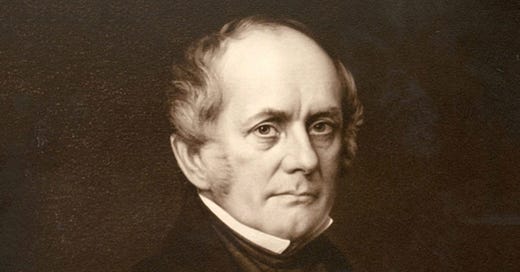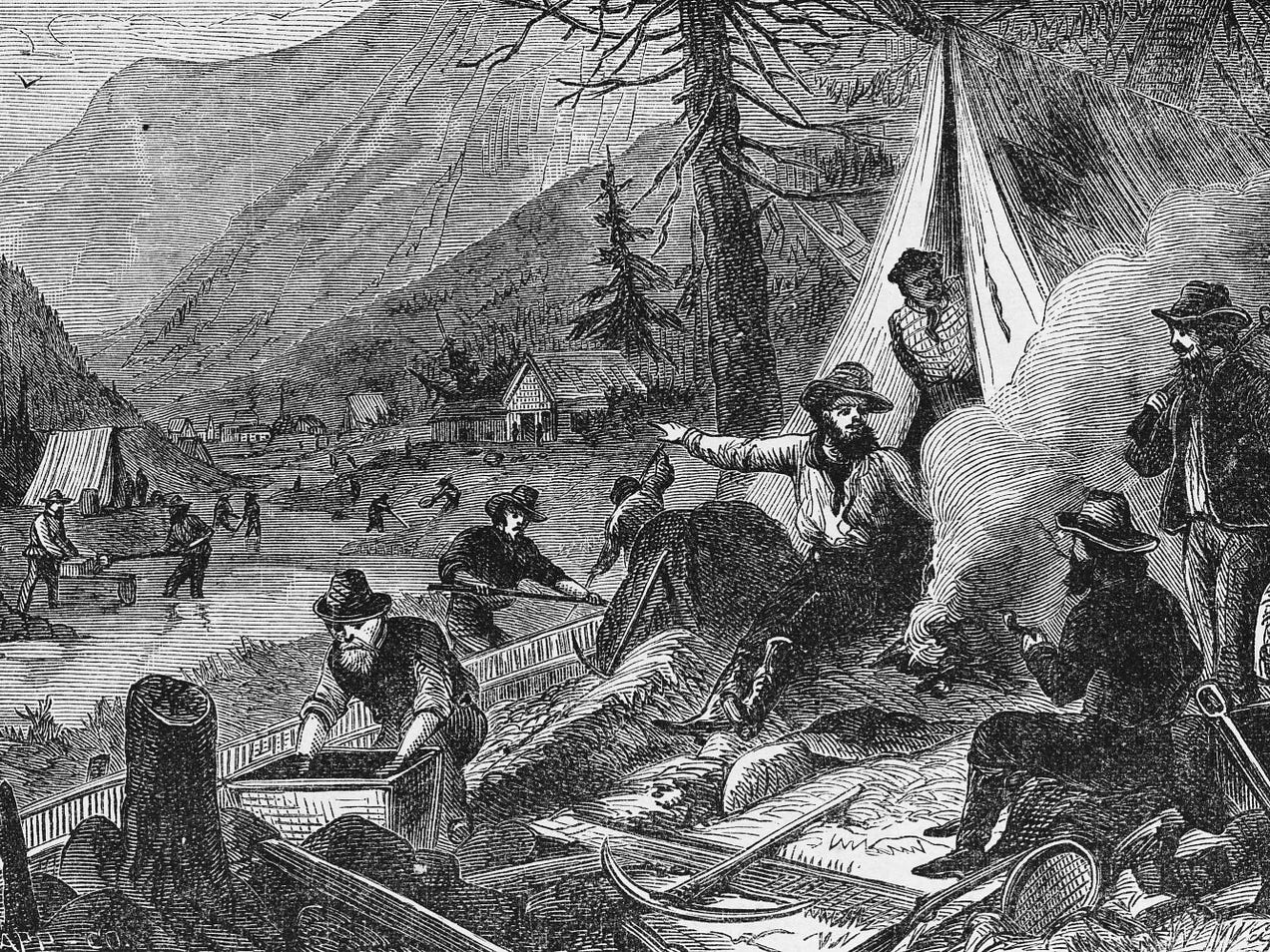The California Gold Rush went viral because of Thomas O Larkin's 'gold letters'
The famed Gold Rush was a local matter, until Larkin's 'gold letters' to the New York Herald announced it to the world - and brought the world to California.
Quintus Hopper of Nevada, published in January 2022, is a historical novel that follows the epic and peculiar life of a frontier newspaper typesetter. As part of my research I made extensive use of newspaper archives and, in this series, I’ll share some of my often surprising findings. Here are history, commentaries and contemporary newspaper articles as they relate to my latest novel. This time, meet Thomas O. Larkin.
In the novel, Quintus Hopper and his mother make the acquaintance of one Thomas O. Larkin. Larkin came to Alta California, then part of Mexico, in the early 1830s. He was American consul to Alta California, part of the Bear Flag Revolt in 1846 and one of the signatories of the 1849 Constitutional Convention. He went on to become an immensely wealthy businessman and – in the novel – he is Quintus’ benefactor.
Larkin led one heck of a fascinating life, and seems almost to have been destined to do so. After all, he was a descendent of one of the passengers on the Mayflower! It appears that, from early on in his life he didn’t like to follow and he didn’t like to obey. He took jobs, he learned, he moved on.
A restless spirit, searching for his place in history. At the age of seventeen he left Boston and sailed to North Carolina. He picked up all there was to learn and then moved on again, this time to Bermuda. He moved and moved again and, remember, in the 1820s most people had heard of the west cost only, if at all, in passing. Over yonder was the veritable Wild West.
By the 1830s there was movement. California was being talked about as the place of opportunity - mind you, it was Mexico’s Alta California then. His brother had gone ahead and in 1831 Larkin chose to join him there. He met the love of his life on the ship - unfortunately, the love of his life was married. Larkin’s life would make for an excellent and fairly epic miniseries - and how the love of his life became pregnant and then eventually his wife - well, it definitely makes for good script material! Feel free to hop over to Wikipedia to discover what happened.
For a time, Larkin was also a correspondent for the New York Herald. His letters to the Herald, today known as the ‘gold letters,’ illuminated what was going on in California. Until then, the gold rush had been a regional matter. But with Larkin’s letters, always signed as ‘Paisano,’ the east of the United States and the rest of the world took note – and soon joined in the rush – and so the life of Quintus, and the lives of millions of others, were forever changed.
September 18, 1848
The New York Herald, New York
Our New Territory.
CALIFORNIA, June 1, 1848.
We still live and have our being in this “Farest West,” with only one serious apprehension, that we are in danger of having more gold than food, for he that can wield a spade, and shake a dish, can fill his pockets, a su gusto. Oh! this California climate certainly influences dispositions. A Californian never dreams of work. Some on horseback have to exert themselves in taming wild horses and cattle, and in the after management of them, but “valga me dois,” those who obtained a stay in this world by headwork, when in office, or obtained credit on the hopes of one (a Californian will pay his debts, but takes his own time in doing this, or any other good thing), had to get up a pronunciamento, occasionally, as funds or credit ran low; the natives having, by the change of flags, been brought to a standstill, must get ahead as they best can by the ownership of a few leagues of land and a few thousand head of cattle.
‘Tis now the Yankee turn, beginning in October, 1846, under Lieut. Washington Bartlett, alcalde of the town of Yerba Buena. Hundreds of our countrymen, obtained in that town, at $15 each, house lots of 50 varas square (130 English feet). This they continued under Judge Bryant and Judge Hyde, one an editor, the other a lawyer of your city. Houses costing $100 to $1,000, sprung up like the story of Aladdin’s times. Fifty varna Iots, without any improvements, sold from 100 to 1,000 Mexican dollars. Merchants, lawyers, blacksmiths, carpenters, etc., became owners of snug little houses. Many sent home for their families; all was doing well. Mechanics obtained four to eight dollars per day; even some of the volunteers came in for a large share by the well-timed and prudent permission of their officers, while they performed their duty to government. Lawyers, $50 a fee; the merchant made 100 per cent; clerks and schoolmasters, 500 to $1,000 per annum. Every one appeared happy and contented, making money without trouble, like a Californian, imagining providence had taken them under special protection. When all this was in the full blast of successful operation, and no probability of its being brought to a close – presto! someone proclaimed that there was, on the branches of the Sacramento, “gold for the gathering.” This cry, I believe, began from the Mormons; immediately the most thoughtless, the most sanguine, took horse or launch for the rivers of wealth. In less than one month they returned to Yerba Buena, now San Francisco, with a few hundred dollars of gold dust, worth, in the States, $17 per ounce. The whole mass of foreign population struck, not for higher wages, but for none at all – spades and shovels rose from $2 to $10; tin pans and cups, to unheard of prices; a few considerate turners and blacksmiths remained to make spades and picks and turn wooden dishes to wash out the sand. These few are now making $20 to $40 per day; cooks and boatmen demand $30 per month. The result, in a few words, is that, more than half, I think three-fourths of the houses, in some towns, are vacated. A passage in the launch rose from nothing to $4, to $8 to $16. Every one brought more astonishing news of this El Dorado of rivers whose bottoms were gold, only requiring to step in, scoop up a handful of black sand, move the hand a few minutes in the water, and there remained the pure thing itself. Rivers, whose banks glittered with the fine black sand, impregnated with quantities of gold that glistened still more until the “eyes ached.” Pans and shovels sold for $30 on the spot; $20 a day was demanded by one to spend a day to go to the nearest rancho for a quarter of meat, or $20 a day to cook for a mess of ten men, $2 a man. This, they say, was submitted to for a few days. Whether these golden stories of rivers of gold were true or false, could not immediately be known. This much was seen. No one from the gold regions had any time to stop to talk or spin street yarns! But with more tools, tea, coffee, flour and crackers, paid for in gold dust itself at $14 per ounce, they were off again. There was no waiting for what the Germans call a stand point. No hesitation – no more misbelief – by the most skeptical; all must go; and, truly, in some towns, all have gone. Near two hundred houses in the town of San Francisco are closed by the owners.
Benicia, a small town of a year’s growth, situated forty miles from the entrance of San Francisco Bay, had but two men left who were earning $30 a day by the ferry. Monterey is now showing strong symptoms of the gold fever, its inhabitants, in general, thinking they are sufficiently rich, can afford for a few days longer to let well enough alone; but onward goes; this fever, raging strongly in the brains of ail, depopulating towns, carrying off men, women, and children. A six-year-old child can gather $2 or $3 a day; a man $10 to $30; old and young ladies in proportion, according to how they admire to stand two feet deep in the water, or can dig with shovels, roll round a wooden dish or basket.
Should these reports continue the year out, and prove to be true, and I continue a monthly report, the mighty Herald for three nations, paying its owner (so he said, or the printer does the saying for him) $30,000 per year, would stop, for want of hand, like the newspapers of California. Who would print Heralds at $3 or $4 a day, when, in the Far West he could gather a cup of gold a day? I had better stop as I am, or your men will quit as it is.
The Indian wars are depopulating the Oregon. Peace will soon disband the volunteers on the Pacific. The astonishing tales from this country, of rivers with bottoms and banks of gold – of quicksilver – pent up for thousands of years in leagues of mountains – only waiting the rush to the Pacific of that ever-restless, never-contented Yankee race, to loose it from its confinement – to make gold and mercury as plenty as all can desire. This news, spreading over the Atlantic States, these three continuing causes, will soon fill California from all parts of our country.
No more. You will not believe a quarter of what I have told you, and your readers not a half; the writer is bound to believe much of it – all of it. How long the banks of our rivers will produce gold dust is our affair. Those who have travelled these splendid regions say there is no end to their riches, although there must be to SU AMIGO Y PAISANO.
I send you a few slips to back my improbable tales of gold and quicksilver.
You can see how people reading the above, working hard under harshest of conditions in the east would have been instantly filled with dreams of gold. After all, he wrote that you could essentially just pick up the gold, a cup a day worth of pure gold! Well, as it turned out for many decades afterwards, gold would require a great deal of labor - and most would never strike it reach. But the boom was there. After those gold letters, read on the east coast and abroad, San Francisco harbor was soon filled with countless ships bringing countless hopeful souls (and, of course, everyone else aiming to profit off of those hopeful souls).
That’s it for today.
Cheers!
D






